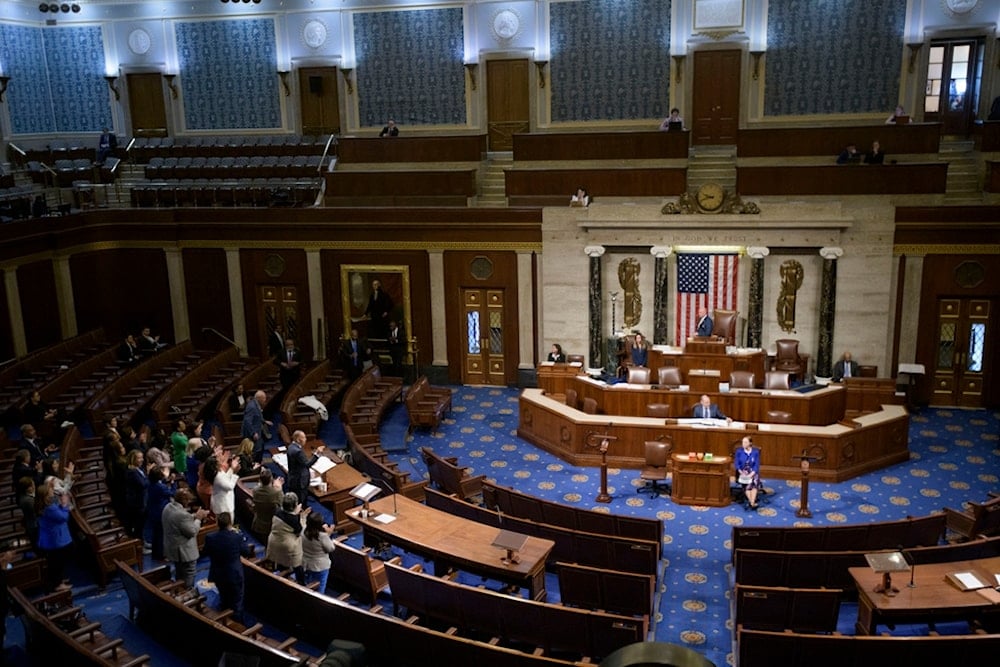US House passes Trump’s $3.9T 'One Big, Beautiful Bill'
The House narrowly approved Trump’s landmark bill, making 2017 tax cuts permanent and adding massive spending, including $46B for the border wall and defense.
-

House Minority Leader Hakeem Jeffries, left, speaks in the House chamber prior to the final vote for President Donald Trump's signature bill of tax breaks and spending cuts, at the Capitol, Thursday, July 3, 2025, in Washington. (AP)
The US House of Representatives narrowly approved the sweeping "One Big, Beautiful Bill" on Thursday, advancing a cornerstone of President Donald Trump’s legislative agenda just ahead of the self-imposed July 4 deadline.
The bill, which passed with a tight vote of 217 to 214, follows a 50-50 deadlock in the Senate earlier this week. Vice President JD Vance cast the tie-breaking vote in the upper chamber, paving the way for the House to hold its final vote.
House Democratic Minority Leader Hakeem Jeffries made a dramatic, last-minute stand against the legislation, holding the floor for 8 hours, 44 minutes, and 25 seconds, setting a new record for the longest speech in House history in an effort to delay the vote.
Originally introduced on May 22, the bill makes the 2017 tax cuts permanent and introduces major shifts in fiscal policy. Among its most debated provisions is a temporary elimination of federal tax on service tips, creating a special deduction that would remain in effect until 2028.
Raising national debt by $3.9 trillion?
However, the bill’s sweeping tax reforms and spending expansions come with a steep price tag. The Congressional Budget Office estimates that the legislation could raise the national debt by $3.9 trillion, while tech billionaire Elon Musk has projected the figure could climb as high as $5 trillion.
Key spending provisions in the bill include:
- $46 billion to complete the Trump-era border wall
- $37 billion in new border security funding
- $25 billion as a down payment for the Golden Dome initiative
- $25 billion to accelerate domestic munitions production
- $15 billion allocated to nuclear deterrence
- $29 billion for the US shipbuilding industrial base
The legislation now heads to the White House for Trump’s signature.
Bill to transfer wealth from the poorest to the richest
Independent analyses indicate the legislation would trigger an unprecedented transfer of wealth from the bottom 10% of earners to the nation's wealthiest citizens.
Research shows that cutting Medicaid and Affordable Care Act funding would strip health coverage from nearly 12 million more Americans by 2034, disproportionately harming low-income residents in a country already struggling with sky-high insurance costs.
Public opinion surveys indicate the legislation ranks as one of the most widely opposed bills in recent history, with disapproval cutting across demographic lines, age brackets, and income levels.
Through targeted amendments, Senate Democrats are amplifying the bill's most controversial elements, extending from eroded health coverage to slashed food benefits and gutted renewable energy support.
With Rand Paul and Thom Tillis already opposing the bill, Republican leadership can only withstand one more GOP senator abandoning the party line.
Big Beautiful Bill faces complaints
The House could take up the Senate-passed bill as soon as Wednesday, though the legislation faces resistance from both ultra-conservative members demanding deeper spending cuts and moderates concerned about the proposed Medicaid reductions.
As voting commenced, Elon Musk, Trump's former key ally who recently had a bitter public rift with the president over the legislation, doubled down on his harsh critiques while advocating for the creation of a new political movement.
The former head of Trump's Department of Government Efficiency, who resigned in late May, launched fresh attacks by condemning Republican support for what he called "debt slavery" as the legislative battle intensified.

 4 Min Read
4 Min Read








